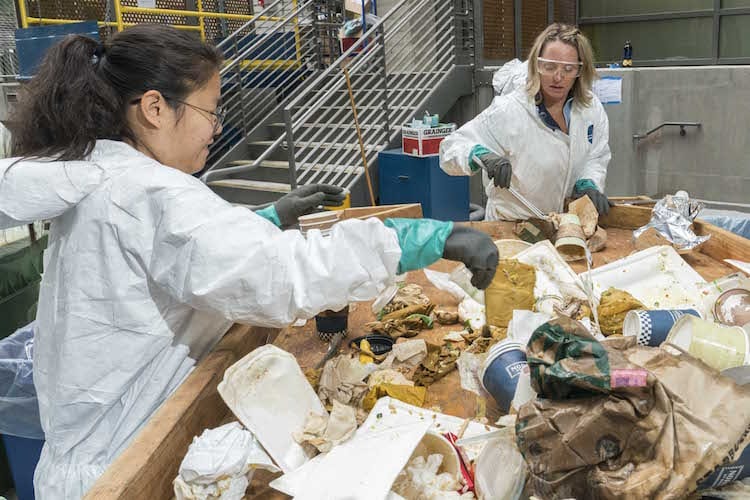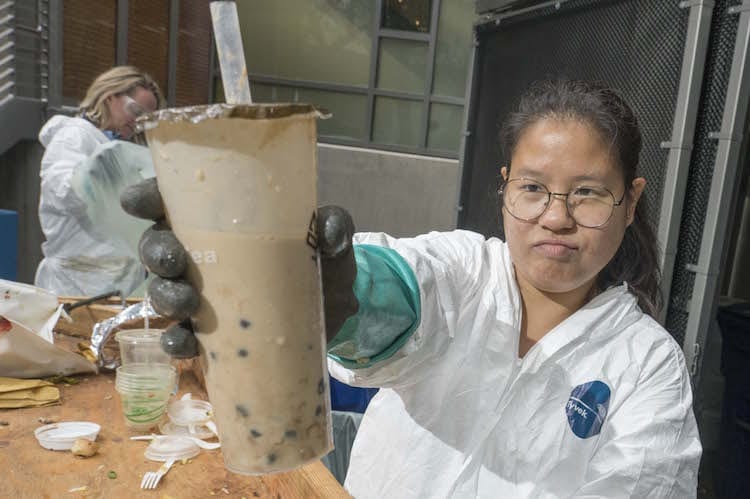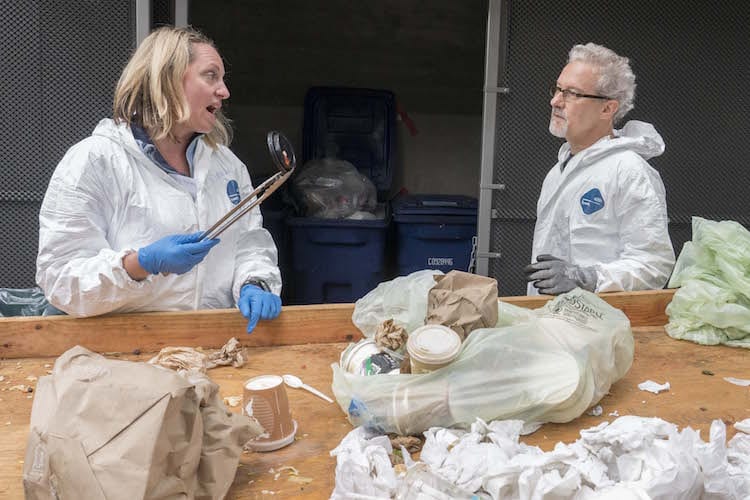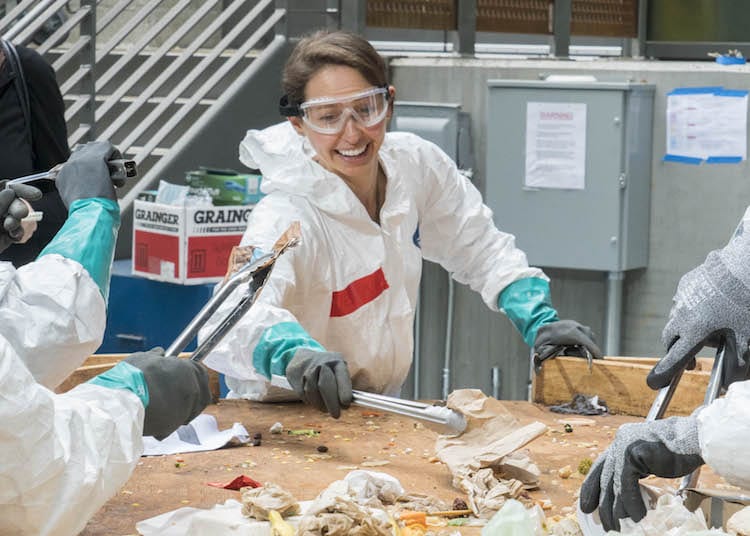
Haas Green Team leader Danner Doud-Martin and the Zero Waste Initiative volunteers were separating trash on a loading dock behind Chou Hall when former Haas Dean Rich Lyons made a surprise appearance.
“Happy to help,” said Lyons, as he donned the required protective white suit and rubber gloves, grabbed a pair of tongs, and joined the team. “This is important.”
The volunteers, including Lyons and many Haas staff members, rotated in and out during Tuesday’s Zero Waste audit, which is part of the school’s overall Chou Hall Zero Waste initiative. The program is a campus-wide effort of graduate and undergrad students from Haas and the College of Natural Resources, along with the Cal Zero Waste office, the staff-led Haas Green Team and several faculty champions.
The good news is that Chou Hall is currently on track to become the first TRUE Zero Waste certified business school building in the U.S. and the first certified University of California building. The project’s scope is wide, including requisite reusable mugs and water bottles, which can be replenished at filling stations, to the use of compost and recycling bins located on each floor. The goal is to divert at least 90 percent of Chou Hall’s waste and achieve TRUE Zero waste certification by the end of 2018, becoming the first business school in the country to do so.
Tackling the challenges
Waste audits— which require separating compostable items like soiled paper towels and used paper cups from recyclable cans and bottles—are a required component of that certification to better understand the current waste practices and provide a benchmark for improvement.
“We’re looking to find out what issues people are having when they are at the bins and trying to sort their waste,” Doud-Martin said. “It’s not easy and we are trying to make it easier.”
As music pulses from Doud-Martin’s iPhone speaker, the volunteers dump individual compost bags on the table and comb through a weekend’s worth of waste. The smell is pungent—a blend of spoiled vegetables and soup, mixed with old coffee.

Separating waste into plastic barrels that hold compost, glass, metals, cardboard, and multiple kinds of paper can be confusing. Many questions emerge as the volunteers lift the individual pieces, squint at the numbers on the plastic container bottoms, and wonder aloud about the difference between a #1, a #2 and a #6.
Among today’s problem areas are Boba tea cups, which seem to pop up in every bin and often aren’t recyclable, and energy bar wrappers, Doud-Martin says.
“Snack packages are a big challenge,” Doud-Martin said.
That thought leads Emily Pelissier and Seren Pendleton-Knoll, both from the Haas Center for Responsible Business, to discuss the challenges snack bar makers like Clif Bar face in developing a recyclable wrapper, including shelf life expiration issues and the overall expense.
Doud-Martin holds up a commonly used black plastic coffee lid with her tongs. It’s a #6.
“Unrecyclable,” she said.

Small plastic condiment containers that students often tote in to accompany a salad or a Chipotle burrito are also a frequent offender. They need to be packed out of Chou Hall, not dumped in the compost, she said.
The most confusing part of the separating, perhaps, is the voluminous amount and kinds of plastic: there’s compostable plastic, a lot of it originating from Café Think, which uses a corn-based plastic material for its utensils, cups, and trays; and there’s the recyclable plastic and the non-recyclable kind, like that coffee lid, that goes into the landfill.
Making key changes
After the sorting, the team volunteers weigh all of the piles. Later, they’ll analyze how people in Chou Hall are currently sorting waste, identifying what’s being improperly sorted and the biggest waste generators.
The audit, which lasts all week, is the third that the Haas Zero Waste Initiative has led. The first one was completed in Oct. 2017; the second one was done in July.
Following the last audit, the team was able to use the data to make some adjustments, including working with the Evening & Weekend MBA program to change their student snack offering to bulk items, implementing a coffee grounds donation program that allows UC Berkeley’s Gill Tract Farm to use Café Think’s grounds as garden compost, and installing two-roll instead of one-roll toilet paper dispensers in the bathrooms to conserve toilet paper. (Cleaners are less likely to toss an almost-spent roll if there’s a second one in the dispenser, Dodd-Martin said.).
The school isn’t required to do multiple audits, but with the Zero Waste deadline looming, the Zero Waste Initiative Team is preparing to use all of its data when submitting its application to the U.S. Green Building Council, which does its own separate audit.

Jessica Heiges, the Chou Hall Zero Waste Initiative student lead and a candidate for the Master’s of Development Practice program at the College of Natural Resources, has been working on the project last school year and all summer.
Heiges, who got involved because her master’s degree focuses on supply chain management and waste management, is most interested in what’s being generated from where—and whether people are sorting correctly.
“Change starts here,” she said, as she sorted. “Chou Hall is the first building in an eventual campus-wide zero-waste zone.”